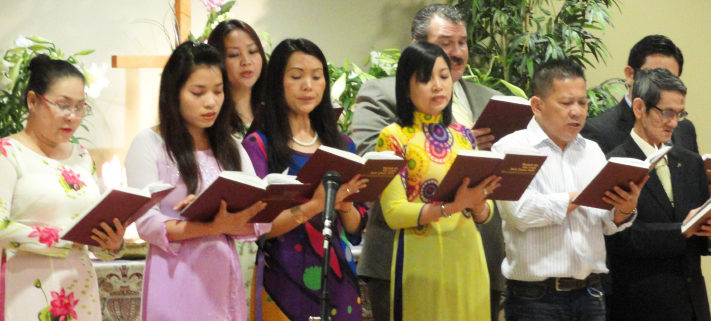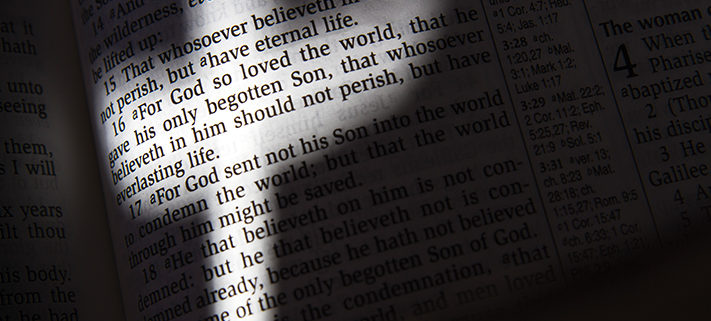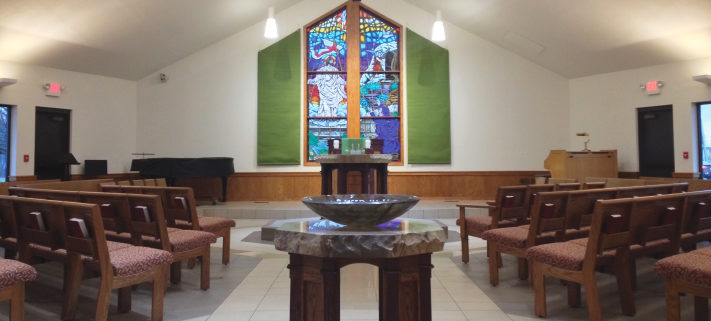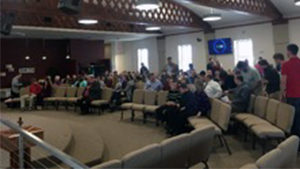Resurrection’s first service was held celebrating Christ’s resurrection on Easter Sunday, 1983. After worshiping at a fire station, shopping center, and YMCA, our sanctuary was constructed in 1991. Rather than building a WEF facility (worship-education-fellowship), the congregation pushed to build a sanctuary that would be large enough for the church to grow into. The tradeoff for more square footage was used furnishings.
The century-old altar was from a WELS church in Michigan. It was painted white with gold accents and had a reredos with intricate carved spires. The altar, along with the matching pulpit, lectern, and font, was beautiful, but out of place in the architecture of the rest of the building. The pews were from a Catholic church, and seasoned members knew which seats to stay clear of to avoid being pinched. The vacuum-tube organ was a hand-me-down from a church that had itself received it as a hand-me-down, and the Communion rail was from a church in Green Bay. Even before the sanctuary was dedicated, there was hope that when the time was right the furnishings would be updated.
Ten years later, it was time to start work on another building project—an expansion including a fellowship hall, four classrooms, offices, bathrooms, and an excellent kitchen. Renovating the sanctuary at the same time was also considered, but an expansion and a sanctuary renovation were too much to do all at once. The fellowship hall expansion was dedicated in 2006.
When I arrived in 2010, the members were eager to see if it might finally be time to complete the renovation. They had heard enough visitors over the last four years remark, “What a nice kitchen you have!” While well-intended, those words were the kind of backwards compliment that sticks in the craw of Lutherans who want the most memorable part of Resurrection to be our worship life together in the sanctuary—not the kitchen.
And so, the idea of renovating the sanctuary was on the table at the council meeting nine days after I was installed as pastor. Within four months, a committee was working to design a sanctuary that would emphasize Christ. Our architect and liturgical consultant understood that Lutheran worship centers around the means of grace and were able to help us design a layout and furnishings that fit with and proclaimed our faith. Two and a half years later, on Easter Sunday 2013, we celebrated our 30th Anniversary in our new sanctuary.
A Building & a Church
One of my seminary classmates reminded me recently: “Building the building is a lot easier than building the Church.” That’s because the Church isn’t made out of bricks and mortar. It’s made out of people. As difficult as it is to have 160 people agree about paint colors, it’s even harder to change one human heart.
One of the dangers of an article like this is that it can come across as a rosy fairy tale of success. Yes, we completed our sanctuary renovation, and yes, I’m happy to share some of our joys. But a renovated sanctuary has not solved all our problems, because in the end our greatest struggle at Resurrection never was the fact that our sanctuary couldn’t live up to the kitchen.
The greatest struggle is in applying God’s Word to people’s hearts. No building project can do that; it has to be the Holy Spirit’s work. That work was going on here at Resurrection long before we updated our sanctuary, and I’m praying it will continue long after. Then why renovate? Because our building is a tool to use in ministering to people. We want a sanctuary that, to the best of our ability, points people through Word and sacraments to Jesus Christ and the forgiveness and hope we have in him.
Things That Needed Some Work
One of the challenges of a renovation is working within the constraints of what already exists. For us, that meant the exterior walls and the steel posts supporting the roof had to stay put. But inside, we had much more flexibility. Because of our history, no one here at Resurrection was emotionally attached to the pews, and there were no “gewidmet von” plaques on the candlesticks. Not that the whole process was emotionally easy…we had plenty of things to work through together. But for the most part we had a blank slate as everything needed an update. Here are some of the areas we addressed:
Font, Altar & Pulpit
The new font, altar, and pulpit are now in a line on the central aisle. As you walk into the sanctuary, the means of grace are visually emphasized one after another: Baptism, the Lord’s Supper, God’s Word. After seeing the limited options in church furniture catalogs, it was exciting to design our own furnishings with our consultants. The pulpit can be popped up on castors and moved for special events (for example when the Seminary Chorus came for a concert). The free-standing altar and the font share a matching octagonal design. The heavy sandalwood stone tops are from a quarry in Colorado. Neighboring Toledo is nicknamed “Glass City” because of the history of that industry here, so we had our font bowl handmade by a local glass artist. On the ring of the bowl is a paraphrase of Romans 6:4,5…one more way to emphasize the resurrection at Resurrection.
Artwork
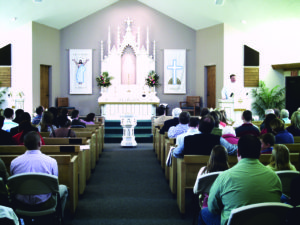
Altar and font – before
Aside from the chancel furniture and a pair of vinyl-on-canvas banners, our sanctuary didn’t have any artwork. Our architect liked to refer to the huge, bare, back wall as the “sea of drywall.” Our renovation addressed this in two ways. First we added architectural detail—the kind of things that bring the room together without demanding your attention. Wainscoting wraps the room. Pilasters ring the back half, and a stained oak organ chamber façade has replaced the “sea of drywall.” We saved the eye-catching artwork for emphasizing Christ Jesus, crucified and risen, and the means of grace. A crucifix is suspended over the altar, and a new stained glass window of Jesus appearing to Mary Magdalene on Easter gives the whole space the flavor of Resurrection. In the year after the renovation we were able to add new paraments on the pulpit, banners flanking the stained glass window, and a paschal candle. While it’s easy for artwork to be the first thing to be cut from a budget, I’m glad we were able to keep these as part of our renovation. Our art preaches a silent sermon at every service and is now part of the mental image when people think of Resurrection.
Instruments
At one committee meeting, I presented a report on my dream instruments: to replace our aging upright piano with a Yamaha C2 grand piano, and to replace our vacuum-tube organ with a pipe organ. The very next meeting, one of our committee members reported: “I know a guy who wants to trade his Yamaha grand piano straight up for a Harley.” While we didn’t have a Harley to trade, it was true that a man 45 minutes away had bought a new Yamaha for his new recording studio. The studio had folded, leaving a man who didn’t play piano with a Yamaha C2 in his living room. It has amazed me again and again how God has a way of meeting our needs in ways we never knew were so close to home. We’re still waiting for the organ, though as part of the renovation we did finish an organ chamber that’s ready to receive pipes someday.
Acoustics
It takes some careful thought to find the acoustical sweet spot that’s clear for speech and at the same time reverberant for music and congregational participation. After receiving recommendations from our acoustical consultant, we replaced carpet with tile, thickened the drywall on walls and ceiling, and added 3D architectural features to diffuse slapback and flutter echoes. We added an audio loop system for people with hearing loss and worked to improve my mic’s performance in our sound system. It’s hard to say exactly how the new space would sound without those changes, and some of our members would prefer a lower reverb time. But for me proof came the first Sunday in the new sanctuary. On the way out, someone asked, “Was the piano mic’d?” I responded, “No. That’s just the room.”
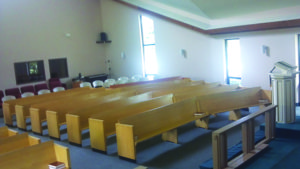
Sanctuary – before
Layout
Previously, the choir gathered in the back corner around the piano. The computer desk and AV equipment were out in the open with wires all over the place. Two small sacristy closets provided limited storage but had no function for worship. Now, the old pews have been replaced with moveable seating. We have a dedicated music area made possible by removing the sacristy closets. Our new AV room is organized and can be locked.
Lighting
Buzzing fluorescent lights and can lights in the ceiling were replaced with LED spotlights, halogen uplights, and fluorescent pendants. All the fixtures are dimmable for special services.
Flooring
Worn carpet was replaced with tile. A favorite detail in the project is how our architect patterned the tile to emphasize different areas of the room. It’s like a map directing the flow of worship and drawing your eyes to the font and altar.
Four Things I Wrestled With
We’re not the only ones who have addressed these sorts of things. So rather than going into more detail on any of them, here are four things I wrestled with specific to our renovation but common to many projects:
One Room Or Two
One of our first major decisions was how to lay out the new sanctuary. Many churches are long, narrow rectangles with the means of grace set off behind a railing at one end. Some call this a “two room” design. While I haven’t seen WELS churches with a rood screen or iconostasis (as in some Anglican or Eastern Orthodox churches), I have seen churches where the pastor’s chair and the altar are separated from the congregation by not one but two sets of railings. To what extent should the pastor and the means of grace be separate from the people?
In a one-room design, the means of grace are placed among the people. A one-room design can still be a rectangle. But instead of a chancel at the end of the rectangle, font, altar, and pulpit are in the middle of one of the long sides with the people gathered on three sides. (Think of the MLC and WLS chapels.)
Since our existing footprint was basically a square, our best one-room design option was to place font, altar, and pulpit on the center aisle axis. Much more could be written about the pros and cons of each design, but one thing I like about the one-room design is how it brings people closer spatially to the means of grace and closer to one another. It is the same Baptism with the same blessings whether the font is far away behind a railing or within arm’s reach every time you enter the room. But psychologically there’s a difference between the two.
However, that closeness brings with it another question:
Solitude & Community
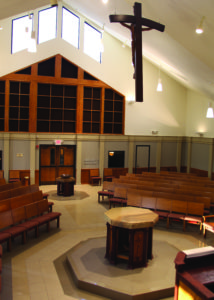
Sanctuary – after
Along with being a mix of young and old, men and women, rich and poor, our congregation is a mix of extroverts and introverts. Some people thrive on being with others; others want to blend in, be anonymous, and hope that no one outside their circle of close friends will stop to talk to them. So in designing a place for people to be together for worship, to what extent should worshipers be aware of the people around them?
In some designs, it’s possible for someone to sit in a pew and see nothing but backs of heads for the entire service. Not that the focus of worship is on each other. The focus is on Christ, crucified and risen, given through the means of grace. That, however, doesn’t exclude awareness that public worship is about more than just my personal relationship with God. We are members of the Church. In my daily devotions it is just me and God. But on a Sunday morning it is not just me. I am together with my Christian family.
In our sanctuary, pews are at a 45° angle to the main aisle, and two smaller banks of chairs face each other directly, with the altar in the middle. We don’t spend the service staring at each other, but we do see other faces. We commune in a complete circle around the altar, so that the crucifix is above, Christ’s body and blood in the middle on the altar, and fellow Christians on all sides. This has been a significant adjustment for people who would prefer not to be noticed. As I’ve worked through this pastorally, I still wonder: is this too much to ask of an introvert?
Empty Cross Or Crucifix
One of the most difficult decisions was whether to have an empty cross or crucifix. As Americans, it’s hard not to be influenced by the Reformed compunction about images. “It’s too Catholic!” Others wondered why we couldn’t just have Easter. I was expecting those two objections and felt I needed to push back somewhat, especially against the theology of glory embedded in the second.
The more I thought about it, however, the more it hit me that it’s also a matter of law and gospel. Every time I watch The Passion of the Christ, I feel that Mel Gibson is trying to make me feel guiltier and guiltier as Jesus is struck again…and again…and again. I saw plenty of crucifix designs where Christ is contorted in agony, as if it were a competition in the grotesque. “This crucifix ought to make you feel really, really bad!” I think for many people a crucifix is a symbol of law. They miss God’s love and grace there. If that’s the case, why would you want to hang a reminder of your guilt in your church? Doesn’t your conscience do that already?
In the end we do have a crucifix. Our renovation committee and the majority of our congregation were in favor. But I still wonder if I could have done more pastorally for those who were or are troubled by it. It hangs prominently over our altar as a visual reminder that, although many in our world may not, we boldly preach Christ crucified. It is balanced by a stained glass window of Jesus on Easter, so that Christ crucified and risen really is the focal point, not only of our message, but of our artwork as well. I’ve made it a conscious goal in my preaching to reference Christ on the cross: while people may think of their sins when they see the crucifix, they may think even more of God’s love and absolution.
Planning & Giving
Throughout our renovation I wrestled with the Catch 22 between giving and planning. The circle goes like this: You can’t draw up realistic plans without knowing how much people are able and willing to give. At the same time, people have a hard time giving without seeing the plans. So how do you begin?
In our renovation, we had to just jump in that circle and work through several cycles of planning and giving. We still have a large mortgage from the 2006 fellowship hall expansion, so we needed to complete the project without borrowing. It would have been easier if we would have known we were borrowing a certain amount of money, and that therefore was our budget. Instead, we needed to continually update plans to the unknown—what our congregation would be able and willing to give. That’s not the most efficient process. It means we had to rework the same plans several times. But sometimes working together with others is more important than efficiency.
Why Renovate Old Churches
It’s been four years now since we finished construction. Sometimes the question still haunts me: Was it worth it? The time? The financial and relational stress on our congregation?
It’s been four years now since we finished construction. Sometimes the question still haunts me: Was it worth it? The time? The financial and relational stress on our congregation?
Recently at catechism class two kids, a sixth-grader and a seventh-grader, started talking about the renovation. I didn’t prompt them. They would have been second and third graders at the time. They talked about the old pews. About the old, white altar. About the canvas banners. They talked about how glad they were that we renovated the sanctuary. That they liked to worship there. If for another generation Christ crucified and risen can be proclaimed … that’s why we renovate old churches.
Written by Timothy Nass
Timothy Nass has served at Resurrection in Maumee, Ohio since 2010 and is a member of the Michigan District Commission on Worship.
2017 National Conference on Worship, Music, and the Arts
Kenosha, WI (June 13-16) and Irvine, CA (June 27-30). Worship enrichment for everyone: laypeople, musicians, pastors, teachers, and youth. wels.net/national-worship-conference
[fbcomments num=”5″]

